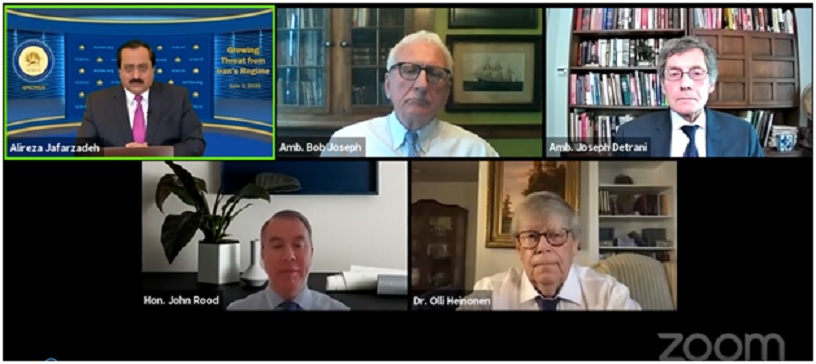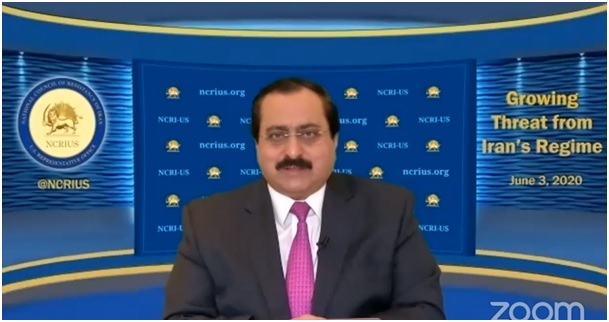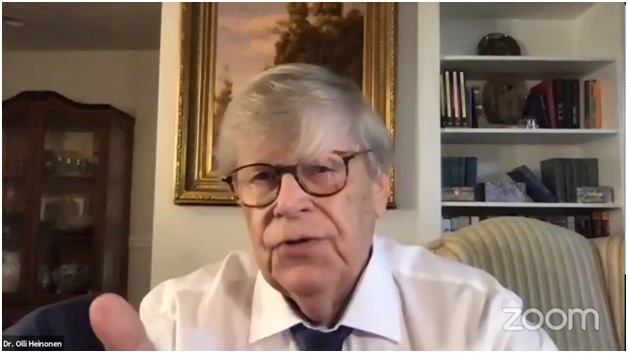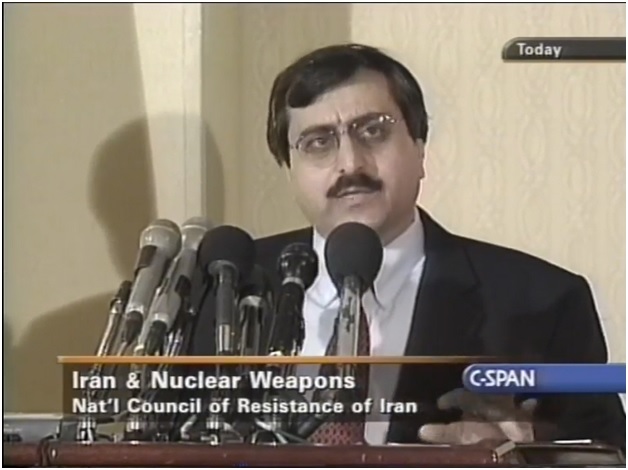Expert Panel Discuss the Growing Threat from Iran’s Regime
NCRIUS | June 5, 2020
 Experts: To Counter Threat from Iran’s Regime, Side with the Iranian People Rising for Freedom, Keep Maximum Pressure
Experts: To Counter Threat from Iran’s Regime, Side with the Iranian People Rising for Freedom, Keep Maximum Pressure

WASHINGTON, DC, June 5, 2020 — On Wednesday, June 3, 2020, the U.S. Representative Office of the National Council of Resistance of Iran (NCRI-US), held a stellar panel of experts, to discuss “The Growing Threat from Iran’s Regime.”
Former Undersecretary of Defense for Policy, John Rood; former Undersecretary of State for Arms Control and International Security, Ambassador Robert Joseph; former Director of the National Counterproliferation Center and Special Adviser to the Director of National Intelligence, Ambassador Joseph DeTrani; and distinguished fellow at the Stimson Center, and former deputy director-general of the International Atomic Energy Agency (IAEA), Dr. Olli Heinonen were the panelists. Deputy Director of the NCRI-US, Alireza Jafarzadeh, moderated the online panel.
NCRI-US Panel : The Growing Threat from Iran’s Regime, Snapback of UN Sanctions, June 3, 2020
Panelists focused on subjects with regard to the Iranian regime and the threat it poses to the international community. Some of the subjects were: the expiring United Nations arms embargo on the Iranian regime, the snapback of UN sanctions, the Iranian regime’s regional aggression, whether direct or through supporting proxy militias, its terrorism and assassination of dissidents abroad, the regime’s missile and nuclear programs and its domestic oppression and crackdown on the Iranian people.
In his opening remarks, Alireza Jafarzadeh, explained the key role the nationwide network of the Mujahedin-e Khalq (MEK) has played inside Iran to expose the horrific extent of COVID-19 deaths, covered up by the regime and its criminal incompetence and depraved indifference during the pandemic. He said, “our movement has played a significant role in exposing the Iranian regime and the role of the regime’s foundations and the IRGC to plunder the Iranian nation.” Jafarzadeh also emphasized that none of the regime’s rogue behavior and policies are supported by the Iranian people. Instead, the people have been chanting “leave Syria alone; think about us,” or chanting, “neither Gaza, nor Lebanon, I give my life for Iran.”

Washington, DC, June 3, 2020 – Alireza Jafarzadeh, Deputy Director of the NCRI-US, moderates the panel on Iran.
The panel’s first speaker, the Honorable John Rood, enumerated a long list of malign actions of the regime in the region. He warned that “I’m concerned that more modern conventional capabilities will be open to Iran for the first time since the revolution, as the UN arms embargo is scheduled to end in October of this year. These more modern arms are likely to fuel an increased adventurism by the regime, as it continues to spread its malign influence.”

Washington, DC, June 3, 2020 – Hon. John Rood, former Undersecretary of Defense for Policy, addresses the NCRI-US panel on Iran.
“What do we do about this situation? I think one thing that is important is to continue the maximum pressure campaign to deplete and limit the ability of the regime, to export its malign influence across the region. It would be preferable if we saw a more multilateral approach as most of those sanctions have been the unilateral US sanctions… US military forces need to continue to work with partners in the region to deter and where necessary take steps like the strike on Soleimani, to restore deterrence, where it has frayed,” Mr. Rood said.
It may be necessary for the United States and our partners to undermine the regime for years before it eventually falls given its unpopularity with the Iranian people.”
— John Rood, Former Undersecretary of Defense for Policy
Undersecretary Rood also noted that “it may be necessary for the United States and our partners to undermine the regime for years before it eventually falls given its unpopularity with the Iranian people, if the regime does not eventually show a willingness to support a negotiated settlement.”
The next speaker, Dr. Olli Heinonen, stated: “The other things which are of concern are related to these atomic archives, which were revealed in 2018… They give the indication that Iran has not really dismantled its nuclear weapons-related R&D. Why? First of all, why to keep those documents stored in that warehouse in Tehran. The second thing, what happened with this equipment, which was brought to Turquz Abad, which also showed some contamination of natural uranium particles, which is an indication that there might be some undeclared nuclear material in Iran.”

Washington, DC, June 3, 2020 – Olli Heinonen, Distinguished fellow at the Stimson Center, Former deputy director general of the IAEA, addresses the NCRI-US panel on Iran.
Dr. Heinonen said that Tehran has produced “about one ton of low enriched uranium, enriched up to 4.5 percent. This amount is actually enough to make one nuclear device if Iran wants to enrich it further to the level of 90 percent.”

File photo: On August 14, 2002, Alireza Jafarzadeh exposed the Iranian regime’s secret nuclear sites in Natanz and Arak. Dr. Olli Heinonen remarked during the NCRI-US June 3, 2020 panel on Iran that: The Iranian noncompliance was exposed in August of 2002 for the first time. Since that date there is no one day that Iran has been in full compliance with its nuclear obligations.”
Dr. Heinonen, a nuclear compliance expert, added that “the Iranian noncompliance was exposed in August of 2002 for the first time. Since that date there is no one day that Iran has been in full compliance with its nuclear obligations under the NPT safeguards agreement. I don’t think that the international verification regime should tolerate such a behavior.”
Ambassador Joseph DeTrani noted that, contrary to the assertion at the time, the JCPOA “wasn’t transformational in a positive way. It was transformational in a negative way. [the Iranian regime] felt more emboldened that they could be more active, and they use the IRGC and the Quds Force in a very, very aggressive manner.” He added that the JCPOA, “was a path for Iran to eventually pursue nuclear weapons.”

Washington, DC, June 3, 2020 – Amb. Joseph DeTrani, Former Director of National Counterproliferation Center, addresses the NCRI-US panel on Iran.
“Until the regime shows their behavior is changing and they’re not causing regional havoc with the IRGC and the Quds Force, whether it’s a Yemen, whether it’s in Lebanon, whether it’s Gaza Strip, or whether certainly in Syria or Iraq, and they are more overt with not only their nuclear programs but their missile programs, we have to keep the pressure on this regime. Understanding that it is the people of Iran that we care about. And we would always be supportive of the people of Iran, but not a regime that exploits the people, and that is adventuresome in their region and a threat to the region and eventually.”
Ambassador Robert Joseph, noting that “the people of Iran are the first and foremost victims of the regime,” remarked that “This is a regime that has lost all legitimacy. It can stay in power only through brute force and the denial of the aspirations of the people for freedom and democracy.” Mr. Joseph emphasized that “Regime change must come from within – from the people of Iran. We can and should help them to accomplish this goal through moral support and through the policy of maximum pressure, but it is on the Iranian people to determine their own future. It is their future to be determined by their efforts and their sacrifices.”

Washington, DC, June 3, 2020 – Amb. Robert Joseph, Former Undersecretary of State for Arms Control and International Security, addresses the NCRI-US panel on Iran.
In his closing remarks, Mr. Joseph shared his main observations following a visit last year to Ashraf 3 in Albania, home to some 3,000 members of the main Iranian opposition, the Mujahedin-e Khalq (PMOI/MEK), saying that “If you go to the camp and you talk to the residents, you can feel the commitment. You can feel the spirit, the dedication of these people to achieve a free Iran.”

File photo: Ashraf 3 in Albania, home to some 3,000 members of the main Iranian opposition, the Mujahedin-e Khalq (PMOI/MEK). Amb. Robert Joseph said during the NCRI-US June 3, 2020 panel that: “If you go to Ashraf and you talk to the residents, you can feel the commitment. You can feel the spirit, the dedication of these people to achieve a free Iran.”
He said he found it to be truly amazing because, despite the torture and execution of many of their relatives, their spirit t is positive, and optimistic – not regretful or revengeful. He also noted that “I also had the opportunity to witness some concrete things that the residents are doing to achieve the goal of a free Iran. For example, reaching out to the people of Iran with a message of hope, with the message of truth, and also activities that relate to the organization of the resistance inside Iran. And I think the MEK has been key to the resistance across the nation. And when you visit the camp, when you look at what they’re doing, when you feel the spirit of these people, there is no doubt why the regime brands the NCRI and the MEK as public enemy number one. And to me, that’s a badge of honor.”
Alireza Jafarzadeh, concluded the panel with his closing remarks and said:
1) The uprisings in 2017, 2018, 2019, and 2020 proved that the Iranian people want change, they are willing to pay the price for it, as 1,500 people were killed by the regime in Nov 2019.
2) COVID-19 pandemic proved that this regime cannot solve any problems.
3) The supreme leader, Ali Khamenei and all other senior officials of the regime have repeatedly talked about the danger of another wave of uprising and that they may not survive the next one. In the height of the pandemic, the regime arrested two elite award-winning students of Sharif University of Technology, which is referred to as the MIT of Iran, because of what the Judiciary said was their ties with the main Iranian opposition the MEK. Another 18 individuals were arrested for similar charges.
4) In the past two years, European countries expelled seven “diplomats,” jailed another one; U.S. arrested 2 MOIS agents in the U.S. charged with spying on the officials of the NCRI, in what the Justice Department complaint described as “capture and kill operations,” and they are in jail now. Of these ten regime officials and agents, eight were arrested in connection with plots against the NCRI and its member organizations. This clearly shows that Tehran’s main preoccupation is to stay in power, and it sees this movement as having the capability and intent to lead the charge for regime change.
5) The stepped-up pressure on the Iranian regime has weakened the mullahs. Maximum pressure has worked. Snapback of all prior UN Security Council resolutions and sanctions associated with them is the way to go forward.


Comments are closed.